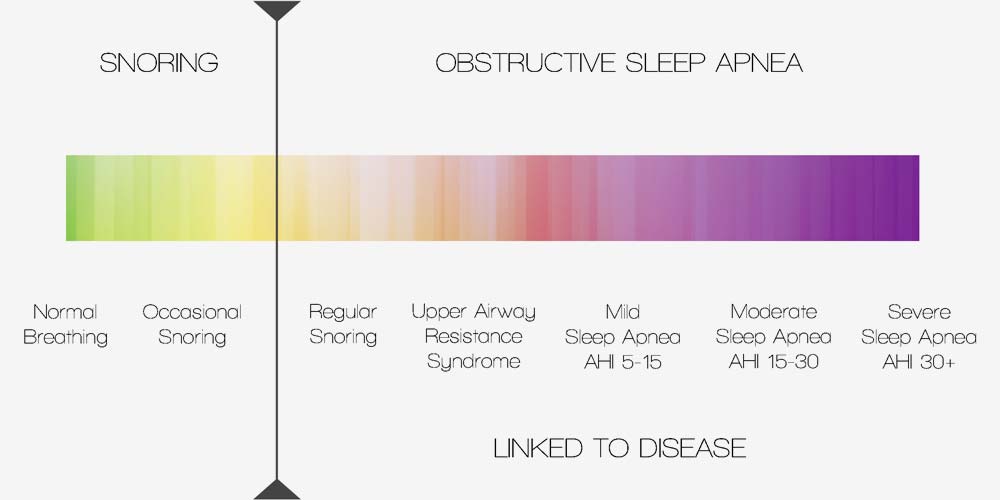Call Our Office
Existing Patients

Snoring is caused when the jaw opens and the tongue falls into the back of the throat, causing the airway to narrow and forcing air through the small opening. This creates vibrations in the throat known as snoring. Although snoring seems physically harmless, it can be a warning sign of a more serious and dangerous condition called obstructive sleep apnea.
Obstructive sleep apnea occurs when the airway completely collapses, blocking airflow to the lungs. The harder one tries to breathe, the tighter the airway seals. This airway obstruction persists until the brain partially awakens the person, unconsciously closing the jaw and returning the tongue and throat to a normal position. This process can occur 50 or more times per hour while asleep, and meanwhile not enough oxygen is being received by the body.
If left untreated, sleep apnea can cause: memory problems, high blood pressure, increased risk of stroke, decreased life expectancy, weight gain, depression or irritability, difficulty concentrating, impotency, headaches, and daytime fatigue.
Sleep apnea is potentially serious sleep disorder in which you exhibit pauses in breathing while asleep (the word “apnea” means “without breath” in Greek). Pauses in breathing can last a few seconds up to a minute or even longer. Detecting an abnormality, the brain then tells the body to wake up to resume normal breathing, resulting in interrupted sleep and restlessness throughout the day.
Obstructive sleep apnea is caused by a blockage in the airway, most commonly when the tissue in the back of the throat collapses and closes while the subject is asleep. On the other hand, in Central sleep apnea, airways are clear but the brain still does not signal the muscles to breathe. Oral appliances effectively manage obstructive sleep apnea.

Because sleep apnea shows its most obvious warning signs during sleep and does not lend itself to detection through more common methods (such as blood tests or routine checkups), it can go undetected for years. Until properly treated, sleep apnea increases the risk of high blood pressure, heart attack, heart arrhythmias, stroke, obesity, diabetes, and cancer, not to mention increasing the risk of accidents during the daytime due to drowsiness.
In order to find the proper course of action in treating sleep apnea, your dentist will conduct various diagnostic tests, as well as recommend that the patient discontinue drinking and smoking.
In patients with mild to moderate sleep apnea, your dentist may recommend Oral Appliance Therapy. Your dentist will custom-fit an oral sleep appliance that will bring the jaw forward to keep the upper airway free of blockages. Much like a mouthguard or a retainer, oral sleep appliances are comfortable and can help avoid more permanent measures, such as surgery.
In special cases, your dentist may recommend surgery of the jaw, which will help pull forward the bone holding the tongue. While this surgery is known to be effective, it is still considered a last resort in the event that more conservative measures proved to be ineffective.
Existing Patients Call